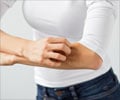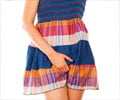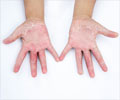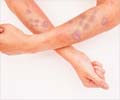- Itching - (https://medlineplus.gov/itching.html)
- 10 Reasons Your Skin Itches Uncontrollably And How To Get Relief - (https://www.aad.org/itchy-skin/relieve-uncontrollably-itchy-skin)
- Itchy Skin after Burn Injury - (https://msktc.org/burn/factsheets/Itchy-Skin-After-Burn-Injury)
- How to Relieve Itchy Skin - (https://www.aad.org/itchy-skin/relieve-itchy-skin)
- Itchy Skin - (https://www.nhs.uk/conditions/itchy-skin/)
What is Itchy Skin (Pruritus)?
Itchy skin or pruritus is an uncomfortable and unpleasant skin sensation that urges the person to scratch. It may be due to a skin condition, or due to a systemic illness like liver or kidney disease.
It may be localized or generalized, and can be acute or chronic (lasting more than 6 weeks). Your skin may appear normal or show an obvious pathology.(1✔ ✔Trusted Source
Itching
Go to source)
What are the Causes of Itchy Skin?
Causes of itchy skin include:
I. Skin conditions result in obvious skin lesions. They may be localized to one part of the body or may be spread throughout the body. Skin conditions that cause itchy skin include:
- Dandruff
- Allergic conditions like urticaria and contact dermatitis
- Psoriasis
- Eczema
- Inflamed hair follicles
- Prickly heat
Conditions that can predispose to some of the above skin diseases include:
- Allergy to certain foods or medication
- Hot, humid weather conditions
- Direct contact with:
- Rubber, that contains latex
- Metals like cobalt or nickel in jewellery
- Cosmetics, hair dye, nail varnish hardeners
- Exposure to plants like sunflowers, tulips, daffodils
- Exposure to dyes and resins used in the textile industry
II. Infections:
- Fungal infections like ringworm, athlete’s foot and yeast infection
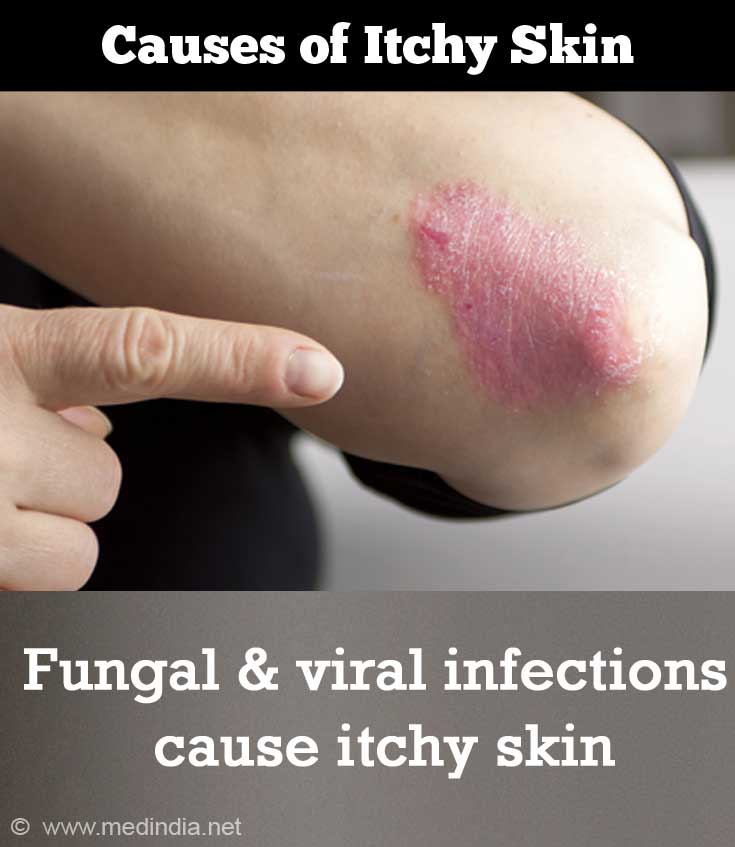
- Viral infection like chickenpox and measles
III. Insects & Parasites:
- Infection by trichomonas vaginalis, a sexually transmitted infection (STI)
- Bites from insects like bees, mosquitoes, bedbugs and fleas
- Infestation by scabies mite or lice
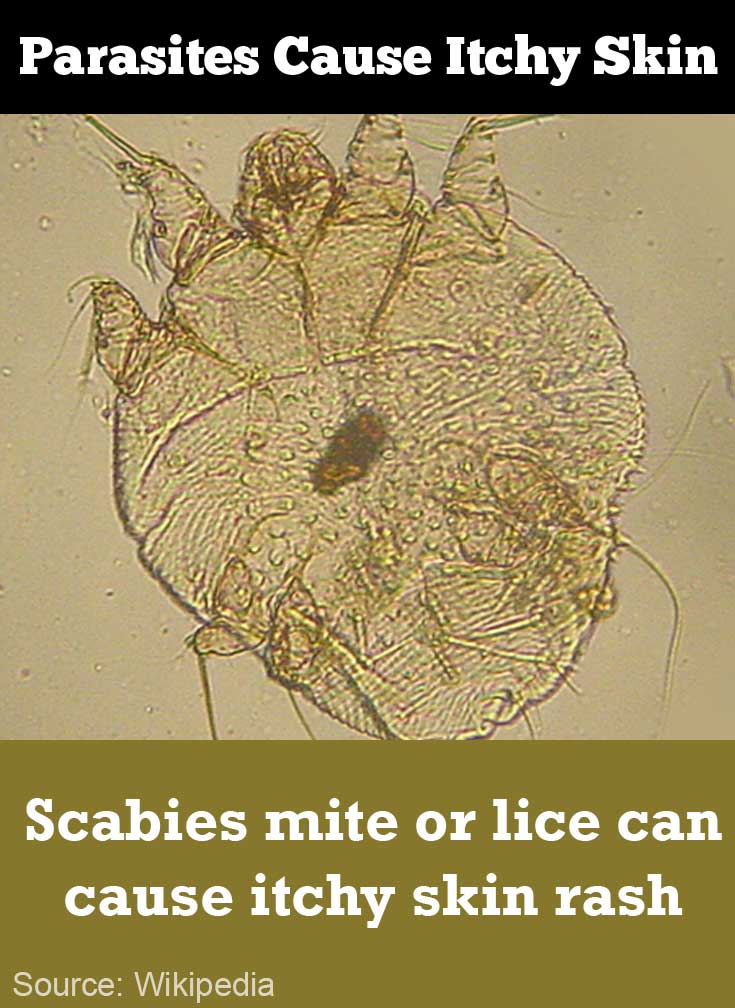
IV. Other Conditions:
- Piles (hemorrhoids)
- Hormonal conditions like thyroid disorders, pregnancy and menopause
- Iron deficiency anemia
- Liver disease or kidney failure
- Cancers of liver, pancreas, leukemia and Hodgkin’s Lymphoma
- Psychological conditions like depression or anxiety
- Nerve disorders such as multiple sclerosis, diabetes mellitus, herpes zoster(2✔ ✔Trusted Source
10 Reasons Your Skin Itches Uncontrollably And How To Get Relief
Go to source, 3✔ ✔Trusted Source
Itchy Skin
Go to source)
What are the Symptoms and Signs of Itchy Skin?
Itching may be localized to a particular part of the body, or may be generalized. A condition like a thyroid or liver or kidney disease produces more generalized itching, whereas a local lesion on the skin often produces localized itching. The skin may appear completely normal or may have the following features:
- Redness
- Scratch marks on the affected part
- Blisters or bumpiness in certain areas
- Scaly or leathery texture of the skin which indicates chronic itching
- Dry and cracked skin. A dry skin is usually itchy
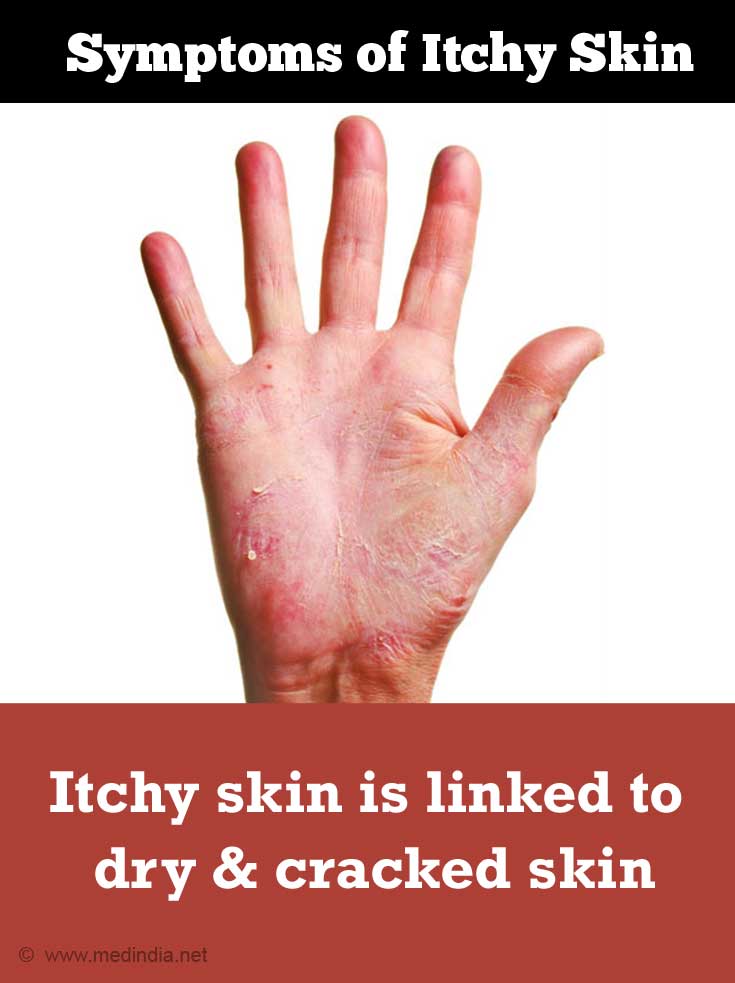
How Do You Diagnose Itchy Skin?
Diagnosis of itchy skin involves a detailed medical history and physical examination. Depending on the suspected cause, the following tests may be done:
- Blood Tests
- Blood Counts: A complete blood count will determine evidence of conditions that causes itching, like iron deficiency anemia
- Thyroid Function Test: Measurement of thyroid hormone levels can help diagnose itching caused by the thyroid disorders
- Liver or Kidney Profile: Blood tests to diagnose liver and kidney disease that may indicate the cause for itching
- Biopsy of the Skin lesions
How Do You Treat Itchy Skin?
Treatment for itchy skin depends on underlying cause. Treatment of the underlying cause usually stops the itching, but there are certain remedies that can be tried and offered by your healthcare practitioner.
Medication
Commonly recommended treatments include:
- For Cooling: Use topical products containing cooling menthol for cooling the skin and relieve itching due to prickly heat. A damp flannel can also help to reduce itching.
- To Control Allergic Reaction: Use
anti-histamine medications. The older antihistamines cause drowsiness but are usually more effective in treating itchy skin. - On Inflamed Areas: Use mild steroid creams (only for few days).
- Other medications like anti-depressants can be recommended if the above treatments do not work or if the itching is particularly long lasting.
- Certain drugs like tacrolimus can be used instead of corticosteroid creams, if the area of itching isn't large.
- Phototherapy: Skin is exposed to certain wavelengths of UV light. This can be done multiple times until itching is under control.
- Anesthetics: Topical anesthetics like lidocaine or benzocaine are also helpful. But, benzocaine should not be used in children younger than 2 years unless recommended by the health provider. In adults, benzocaine should not be used more than recommended dose
- For Dry or Flaky Skin: Use an oily moisturizer or emollient. It is best to apply the moisturizer soon after a lukewarm or cold bath so that the moisturizer retains the moisture within the skin.(4✔ ✔Trusted Source
Itchy Skin after Burn Injury
Go to source)
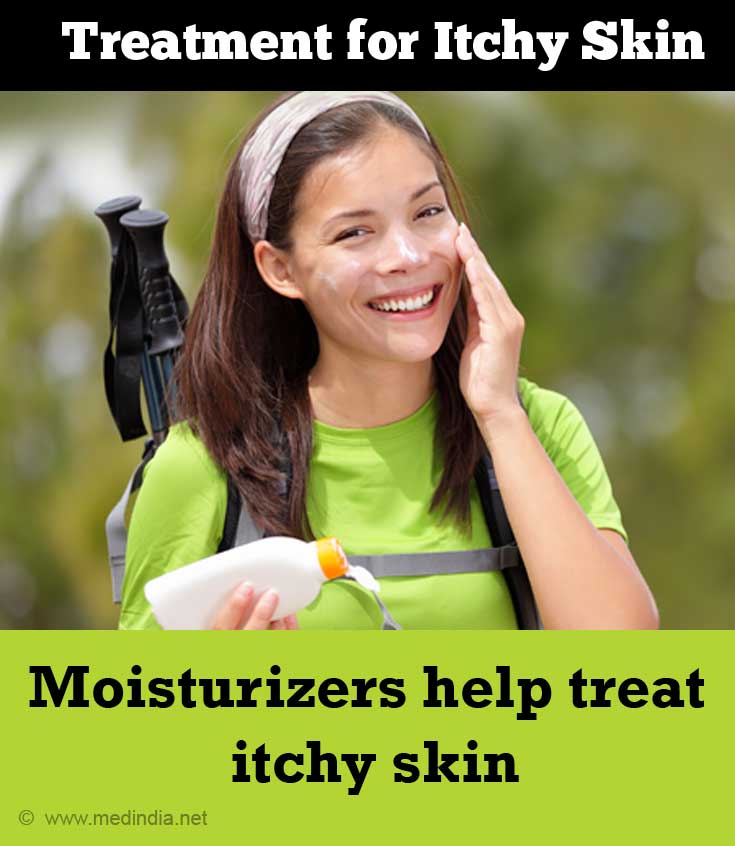
Bathing
- Use cool or lukewarm water instead of hot water. In the lukewarm water, baking soda, uncooked oatmeal or colloidal oatmeal (finely grounded) can be added.
- Avoid using perfumed soap, shower gel or deodorants.
- Reduce your bath time to less than 20 minutes.
- Use un-perfumed moisturizer lotions and emollients soon after the shower to prevent your skin from drying.
- Don’t rub your skin dry, rather pat or dab it.

Clothes
- Wear cotton and silk clothes whenever possible. Avoid irritant clothes or which are too synthetic or tight clothes.
- At night, wear cool, light and loose clothes.
- Since the detergent on your clothes can also cause itching, a mild laundry detergent should be used for washing clothes. While washing clothes, extra rinse cycle can be used to wash away any remaining soap. Towels and bedding should be soft; this is especially true for sensitive skin.
Itching can be worsened by stress. To curb stress counseling, medication, yoga, behaviour modification therapy must be adopted.
Health Tips
To heal dry skin and prevent it from getting worse, below are some of the tips recommended by dermatologists.
- Avoid hot baths and showers that make dry skin worse.
- Keep nails, clean, short or smooth to reduce damage with scratching. Wear loose cotton gloves at night to avoid scratching in your sleep.
- Avoid spicy foods; alcohol and caffeine, since they increase blood flow to the skin, thereby making the itching worse.
- Consider using a humidifier if the air inside your home is very dry.
- Moisturizers should be applied immediately after bathing.
- Apply gentle and unscented skin products only.
- Choose a lip balm good for your lips.
- Consider using an ointment or a cream instead of lotion. Always carry a non-greasy hand cream and apply it after every hand wash, as this can aid in giving relief to dry skin.(5✔ ✔Trusted Source
How to Relieve Itchy Skin
Go to source)






